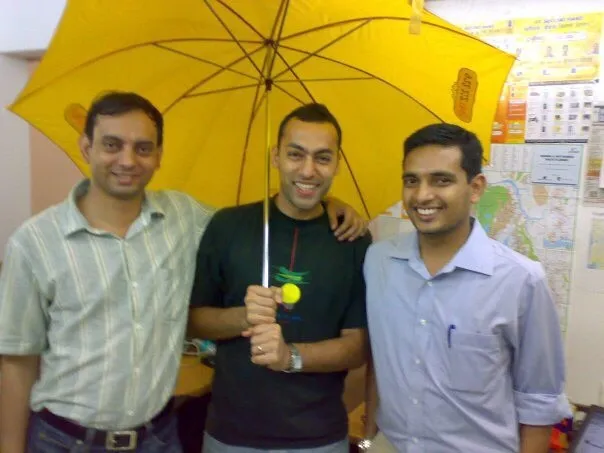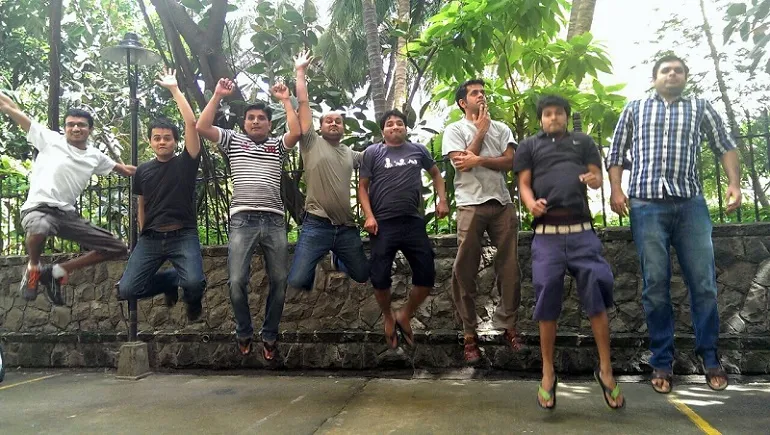'Instead of raising money, I stress on frugality and unit economics,' says serial entrepreneur Kashyap Deorah on building startups
Over the past couple of years, IIT Bombay has become a hot bed for startups. In the recent past, the institute has produced disruptive startups like Ola, Housing and Tinyowl and this has triggered entrepreneurship inside Powai Valley in a big way.
While we hear a lot about Rahul Yadav and Bhavish Aggarwal, Kashyap Deorah had put IIT-B on the global entrepreneurial map almost 15 years ago. His first startup, Righthalf, was the first campus startup as part of the IIT Bombay Business Incubator.
After a successful acquisition of Righthalf by Stratify, he moved to Silicon Valley in late 2000, and worked with high-tech startups doing sales, business development and product management. He returned to India in late 2007 and started Chaupati bazaar, which was later acquired by Future Group’s online arm Future bazaar.

Making of a global product from Powai: the Chalo story
After Futurebazaar, Kashyap wanted to make a global product from India. He says,
After spending years in building products for the Indian consumer market, I was missing Silicon Valley and there was a strong appetite to build a product for mature global market like the US.
Soon, he started an efficient mobile-based payment system called Chalo for restaurants.
In 2013, Kashyap sold his third venture to the US-based restaurant reservation platform Opentable for $11 million. “I started Chalo after Futurebazaar from Powai. After building the initial product, we went to the US and demoed it to Yelp, PayPal and Opentable,” says Kashyap.

Within a few weeks of the demo, Opentable showed an interest in the product and offered an acquisition deal. Kashyap reveals,
At that time, we were about to launch the beta version. However, the acquisition deal from Opentable worked out and Chalo got acquired by Opentable in an advanced alpha stage.
Chalo was basically a payment system for restaurants which curtailed the checkout time after dining by 20 minutes.
The big moment for Chalo came when iPhone 6 was launched. When Tim Cook unveiled Phone6 and Apple Pay, he used the screenshot of OpenTable Payments (Chalo's product) to show how in-app payments would work with Apple Pay. Kashyap adds,
OpenTable was one of the six apps pre-selected by Apple for integrating in-app payments using Apple Pay before the launch. It was one of the strictest NdA's I have ever signed in my life.
At present, Kashyap is working on two ideas. “It’s still very early to comment on them,” says Kashyap. When asked whether he will raise funds for these ventures, he adds, “I have been a part of the first dot com bubble and I know the fallouts of raising money. For me raising money and diluting too much equity is a short term outlook.
Besides startups, Kashyap has also invested in over 20 startups across India and the US but prefers not to name them.
‘Sanity around funding and valuation will prevail after current bubble burst’
Kashyap says,
Short term valuations are certainly a bubble and a few of the celebrated startups in India have achieved perfection at delivering vanity metrics to justify valuations.
He adds,
We have the US benchmark for funding and valuation for e-commerce and hyperlocal startups but why do we forget the two most imperative parameters -- unit economics and operating margin.
Indian e-commerce giants suffer from negative margin in contrast with zero operating margins of Amazon and JD.com. They loose as much as (15 to 25%), which is about 10X of Amazon and JD.com (formerly 360buy).
These numbers clearly emphasize that a lot of unviable stuff is going on in India. In future, if Indian e-commerce companies will bring down their negative margin (or improve their bottomline) from 20% to 0, their GMV will shrink, as major chunk of it is coming from unviable means (discounting, freebies, and selling below MRPs etc.).

Image credit: Kashyap's Flickr account
IPO will bring accountability and reform the status quo
After late stage funds won big and VC's lost out on Chinese markets, the investors couldn't afford to miss placing the bet in Indian startups. Kashyap points out,
A lot of VC's did not bet on China owing to the political uncertainty and risk. But these VCs realized that they lost a big goldmine in China and as a consequence they went overboard in India.
None of the companies started after 2005, like Flipkart and Snapdeal etc., have gone public which brings accountability to a private firm. As of now, very few internet-based companies -- primarily -- Infoedge, MakeMytrip and Justdial -- went for an IPO. Kashyap adds,
When some of the overvalued Indian startups will stage IPO then correction will happen by default.
What went wrong with Futurebazaar, HS18 and Infibeam?
The failure of these companies is largely because they could not raise the same amount of money as Flipkart and Snapdeal. It became survival of the richest, not the fittest. For example, Pantaloon retail was a big thing a decade back. During that period, mall culture was catching up and people used to say Pantaloon will become a $20 billion entity. However, now it’s valued less than a billion dollar company. Kashyap outlines,
It happened because Pantaloons drowned in frenzy of investment (IPO plus a round from Tiger global post IPO). They over leveraged debt and expanded too fast.
Similarly Futurebazaar, HS18, Infibeam, and Naaptol failed to raise massive rounds to keep the momentum. Kashyap asks,
We consider funding and valuation as parameters of success but overlook unit economics and profitability. Why not lay success benchmarks for startups in other (latter) ways?
He adds,
As of now e-commerce in India is survival of the richest not the fittest. And HS18, Futurebazaar, and Naaptol failed to raise massive rounds which crippled their growth in contrast to heavily funded peers like Flipkart and Snapdeal.
Hyperlocal is set for consolidation and correction
Hyperlocal space in India is going through an exciting time, and startups in the segment are giving e-commerce

giants a run for their money. The segment has amassed over $150 million and outnumbered other sectors in terms of investment by a fair margin.Kashyap believes that only a few of the hyperlocal startups will survive in the long haul. Kashyap states,
During the first dot com bubble, the US-based Webvan, a grocery delivery platform, had raised $400 million from blue chip VC funds like Sequoia Capital, Benchmark Capital, Softbank, and Goldman Sachs, and had also gone for an IPO. But it didn’t survive and filed for bankruptcy soon after it went public.
He emphasises that hyperlocal space will also see consolidation as e-commerce giants have identified it as the next growth acceleration channel. Some hyperlocal startups will carve their own niche in the segment, but again deep pockets will be a major decisive factor for winners.
Adds Kashyap as a note to entrepreneurs,
Chase consumer wallet not the investor wallet.



